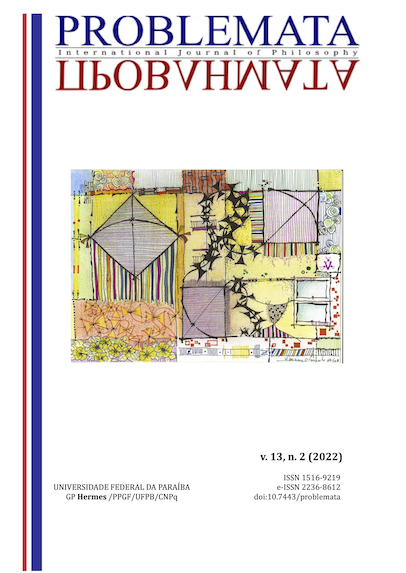JUNGER AND THE WORKER:
CONVICTIONS ABOUT A NEW ORDER
DOI:
https://doi.org/10.7443/problemata.v13i2.61685Keywords:
Ernst Junger, Gestalt of the worker, Typus, World of Work, Total MobilizationAbstract
From the texts between wars, we will argue that Junger's analysis of the worker's Gestalt points to a new planetary order. Junger exalts the mastery of a new human Type, expressed in the worker, responsible for the total technical mobilization. As a way of confronting nihilism and world planning by overcoming the bourgeoisie, the worker emerges as a form of impersonal power, on which the destiny of the Earth rests, and from which results not only the active emptying of the values of the old order, but the possibility of a more elementary world, where there is not a single atom unrelated to work. Mobilizing all the forces of the production chain, the worker emerges as the fruit and configuring agent of the totality of work. Contrary to the state of commodities propagated by the bourgeoisie, it is capable of originating a new way of exercising power, however dangerous and painful it may be.
Downloads
References
ARAUJO, T. A metafísica da Gestalt do trabalhador em Der Abeiter, de Ernst Junger. In: Contemporânea: Revista de Ética e Filosofia Política, v. 1, n. 1, pp. 01-21, jul. 2015
BLOK, V. Ernst Jünger’s philosophy of tecnology: Heidegger and the poetics of the anthropocene. New York: Routledge, 2017.
COELHO, V. O. P. A técnica como totalidade: a mitologia política de Ernst Jünger no entreguerras. Porto Alegre: Editora Fi, 2020
COELHO, V. O. P. Ernst Junger e o demônio da técnica: modernidade e reacionarismo. In: Revista Topoi. v. 18, n. 35, pp. 246-273, mai. 2017
COELHO, V. O. P. Ernst Junger: figuras do conservadorismo. In: Pandaemonium, v. 22, n. 37, pp. 129-157, mai. 2019
COCCO, R. As incidências das reflexões de Jünger no conceito de técnica de Heidegger. In: Sapere Aude, v.10, n. 20, pp. 613-633, jul. 2019
HEIDEGGER, M. Acerca de Ernst Junger. Buenos Aires: El Hilo de Ariadna, 2013.
HERF, J. El modernismo reaccionario: tecnología, cultura y política em Weimar y el Tercer Reich. México: Fondo de Cultura Económica, 1990
JUNGER, E. A mobilização total. In: Natureza Humana, v. 4, n. 1, p. 189-216, jun. 2002
JUNGER, E. An der Zeitmauer. Stuttgart: Ernest Klett, 1981
JUNGER, E. El trabajador: domínio y figura. Barcelona: Tusquets editores, 1990
JUNGER, E. Sobre la línea. In: JUNGER, E; HEIDEGGER, M. Acerca del nihilismo. Barcelona: Ediciones Paidós, 1994.
JUNGER, E. Sobre el dolor. In: JUNGER, E. Sobre el dolor: seguido de La movilización total y Fuego y mivimiento. Barcelona: Tusquets editores, 1995. pp. 09-85
LACOUE-LABARTHE, P.; NANCY, J-L. O mito nazista, seguido de O espírito do nacional-socialismo e o seu destino. São Paulo: Iluminuras, 2002
SÁ, A. F. A política sobre a linha: Martin Heidegger, Ernst Jünger e a confrontação sobre a era do niilismo. In: Revista portuguesa de filosofia, v. 59, pp. 1121-1152, out. 2003.
SILVA, R. M. A. B. O Niilismo Ativo de Ernst Junger. In: Kinesis, v. 12, n. 13, pp. 357-382, jul. 2020
VANNUCHI, A.; VOLPI, F. O Niilismo. São Paulo: Edições Loyola, 1999
Downloads
Published
Issue
Section
License
Copyright (c) 2022 Diego Luiz Warmling

This work is licensed under a Creative Commons Attribution 4.0 International License.
Authors who publish with this journal agree to the following terms:
- Authors retain copyright and grant the journal right of first publication with the work simultaneously licensed under a Creative Commons Attribution License that allows others to share the work with an acknowledgement of the work's authorship and initial publication in this journal.
- Authors are able to enter into separate, additional contractual arrangements for the non-exclusive distribution of the journal's published version of the work (e.g., post it to an institutional repository or publish it in a book), with an acknowledgement of its initial publication in this journal.
-
- Authors are permitted and encouraged to post their work online (e.g., in institutional repositories or on their website) prior to and during the submission process, as it can lead to productive exchanges, as well as earlier and greater citation of published work (See The Effect of Open Access).





